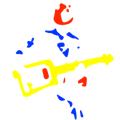After reading another piece 'somewhere' on the internet about the evils of learning music theory I progressed on to update the Syncopation page in the Makin' Music section. This could be a good time to make a confession of sorts. I called the theory section Makin' Music because the word theory tends to scare people, I'm starting to think that was a mistake but I'm not going to change it now. Anyway...
The arguments usually posed are that you don't really need it, the old guys never used it, Hendrix didn't read music, or it's all too hard and I couldn't be bothered. I've even heard people say that it detracts from your playing because it somehow hampers your intuition. Madness, knowledge never hurt anyone.
There'll be times you can get by without any theory, you can get through the Starter Pack course without it. A little brain strain won't kill you though and it will make you a better player, that's why we do it. You may even learn to like it.
What is music theory anyway? Here's one simple definition:
Music theory is a description in words of musical sounds.
When you think of what music is and how it creates emotions and feelings that everyone can understand without any language at all you can start to see why describing it all in words might be challenging. Can you also see how it might be useful? What happens when you attach a word to something? Language enables you to communicate with others but it can also help you get your brain into gear and in doing so make an idea more concrete. When you learn to describe something in words you get a little closer to the meaning of it. This can be very helpful for beginner musicians - if it's done right.
I think the problem is not that it's hard to learn but that it's hard to teach. Too often it's done without a focus on listening. We're trying to describe musical sounds in words remember, don't you think it would make sense to have some music to listen to while you're looking for the words to describe it?
The process of learning involves taking new information and making it fit into what you already know. You know how to listen or you wouldn't be here. You can recognise pitch rising and falling, you can count to 4 and hear a beat, and you can connect this much theoretical knowledge with what you're hearing. You trust this process, you listen a little closer looking for something else, if the explanation is clear you'll hear it too and the new concepts start to form.
An author may know some theory and hear it at work in his or her head but if the reader can't hear it and is left to try and imagine a sound using nothing but words that they don't yet understand then what hope is there?
I would urge anyone studying music to take your theory seriously and use your ears. In schools we don't call it theory we call it listening. We listen to a piece of music and describe in words what we hear, starting with simple everyday language and gradually introducing musical terms until they become part of the language. It works, have a go. When you're trying to grasp a particular concept listen to any piece of music at all and describe what's going on. Surprise yourself.
